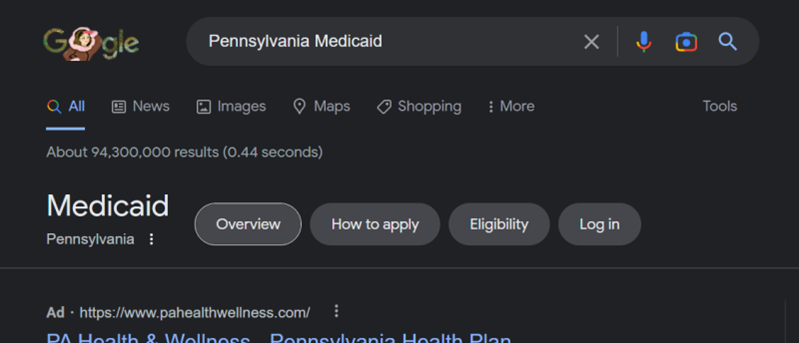MM Curator summary
The article below has been highlighted and summarized by our research team. It is provided here for member convenience as part of our Curator service.
[MM Curator Summary]: Google seeks to replace your local Medicaid eligibility state employee.
Clipped from: https://www.fiercehealthcare.com/health-tech/google-rolls-out-search-features-aim-make-it-easier-sign-medicaid-medicare
LAS VEGAS—When many people are looking to enroll in health benefits, they turn to Google as a source of key information on eligibility, the application process and in-network providers.
In this spirit, the Google Search team has quietly rolled out multiple features for its search engine that aim to make it easier for users to access key information about obtaining Medicaid and Medicare benefits, as well as which doctors locally accept those types of coverage.

(Google)
If someone submits a search query for Medicaid in their state, for example, the top of the results will populate with multiple buttons that direct them to key results on eligibility requirements, how to apply and where they can log in to their accounts. Searching for Medicare generates similar buttons, as well as an option to pull up news about the program.
Hema Budaraju, senior director of product for health and social impact at Google Search, told Fierce Healthcare that access to information is a social determinant of health, and addressing that challenge is a key part of how the tech giant is thinking about equity.
“It’s equity by design in the product,” Budaraju said in an interview at the HLTH conference, “and we’re very proud of being part of the journey.”
Helping people secure coverage is one piece, better enabling them to use it effectively is another. Another recent addition to Google’s search allows people to seek out local physicians and the results will include if those doctors accept Medicare and Medicaid.
When a user clicks into a specific physician, they can also further investigate their options using a “check insurance info” option that allows them to filter by specific Medicare and Medicaid carriers and plans.
Budaraju said the goal was to offer these details in “an easily consumable manner” that enables them to make “timely” decisions about their care and coverage. She added that these tools are not limited to Medicare and Medicaid, and that Google has rolled out similar functionality for the Children’s Health Insurance Program, Supplemental Nutrition Assistance Program and electronic benefit transfer (EBT) programs as well.
The journey in accessing data on these social programs is “nonlinear,” Budaraju said, and often requires people to sift through multiple webpages and sites to find the details they need. That’s why Google saw an opportunity to streamline the experience.
She said the Search team also sees an opportunity to use this framework as a baseline for other scenarios, such as economic security, crisis response or in extreme weather. The focus on equity and easing the user experience is replicable in other areas, she said.
“There is a beauty to understanding, ‘What is the journey?'” Budaraju said.
